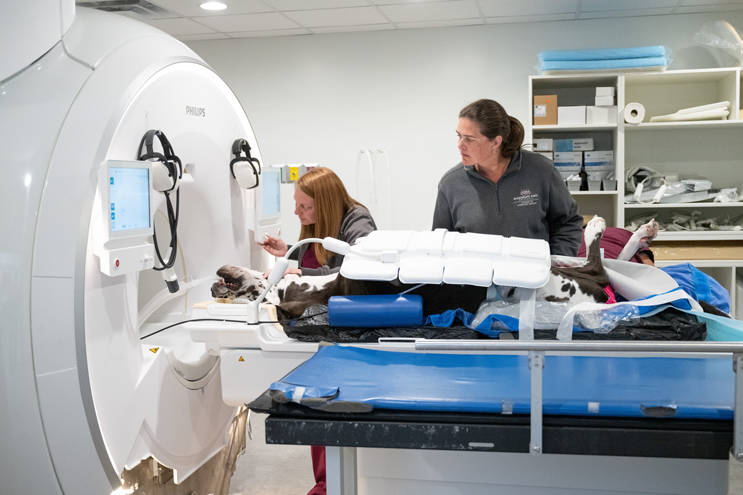
The recent upgrade to the MRI and Neurology facility at the Animal Health Center at the College of Veterinary Medicine at Mississippi State University marks a significant leap forward in both patient care and educational opportunities. The most notable improvement is the shift from a pre-scheduled, time-restricted imaging system to a more flexible setup. Previously, neuroimaging was confined to preset time slots, which is not ideal for emergent cases. With the acquisition of a new top-of-the-line MRI machine, these constraints have been eliminated, allowing for immediate, high-quality imaging tailored to the patient’s needs.
One of the key features of the new MRI machine, a cutting-edge 3-Tesla model, is its enhanced image quality. This improvement is particularly beneficial for visualizing soft tissue structures such as the brain, spinal cord, muscles, tendons, nerves, and ligaments. The high-resolution images provided by this machine are crucial for accurate diagnosis and treatment planning, especially for complex neurological cases where precision is most important.
The integration of this state-of-the-art MRI machine into the Animal Health Center’s facilities has streamlined the imaging process, reducing the need for patients to travel between different locations. Previously, MRI scans were performed at a separate satellite facility, causing logistical challenges and extending wait times. Now, with the MRI located on-site, the entire process—from imaging to surgery—is conducted within the same facility, simplifying the experience for clients and enhancing overall efficiency.
In addition to benefiting patient care, the new MRI setup has impacted educational aspects of the College. Dr. Alison Lee, assistant professor, said,
“The MRI machine has been operational in the animal hospital for about ten months, and its presence has greatly improved the learning environment for students and residents," said assistant professor Dr. Alison Lee. "With the MRI now housed within the hospital, students from various rotations can observe and participate in the imaging process, so they gain valuable hands-on experience. This accessibility also extends to those not on the neurology rotation, widening their exposure to imaging techniques.”
Along with the acquisition of new equipment, the College has also brought in support staff who are expert in its use. One example is Molly Nicholson, an MRI technician with a background in both human and veterinary imaging. She brings a wealth of knowledge and expertise to the team. Her responsibilities include not only operating the MRI machine but also teaching students about its functionality, setup, and troubleshooting. Her involvement ensures that students gain a thorough understanding of MRI technology and its application in both clinical and research settings.
Additionally, the new MRI facility supports research opportunities that were previously unavailable. The 3-Tesla magnet has potential applications for in-house research, which can contribute to advancements in both human and animal medicine. This capability opens up new avenues for exploration and innovation, further solidifying the animal hospital's commitment to excellence in veterinary care and research.
The neurology treatment room also underwent a renovation this year.
“The new advancements to the neurology service are going to allow us to better serve the clientele of Mississippi and the surrounding Southeastern states,” said Dr. Michaela Beasley, clinical professor and hospital interim director. “The new treatment room and student area provide a very nice place for the students to call home while on the neurology service; it will be great for student learning.”
Overall, the upgrade to the MRI facility represents a major advancement in patient care, student education, and research capabilities. The improved imaging technology, combined with enhanced training opportunities and streamlined processes, positions the animal hospital as a leader in both clinical practice and veterinary education. This development is set to greatly benefit the clientele of Mississippi and the surrounding Southeast, ensuring that the highest standards of care and learning are upheld.
“These upgrades represent a major advancement in patient care, student education, and research capabilities at our college and further position us as a leader in both clinical practice and veterinary education,” said Dr. Nick Frank, dean of the College. “Our goal is to always provide the highest standard of care for patients and learning for our students, and improvements such as this are an important part of doing so.”
